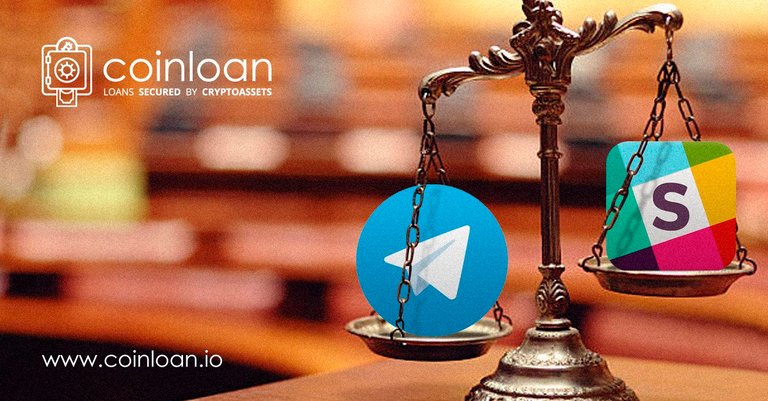As a platform for communication, lots of ICO and other projects, including CoinLoan earlier actively used a group in Slack. Initially, our team actively developed Slack community too, but later we decided to move on Telegram platform. Below, there are 3 reasons why we did it.

1. Registration without moderation
At first, we chose Slack as a platform for developing our community and attracting new people. In Slack, the flow of people is greater than in Telegram. However, it has one huge disadvantage. For registration in Slack, you need only email. It means that registration is available to bots and to people, who want just to advertise their products. This, in turn, leads to scams.
2. Lots of bots and spammers, which you can't switch off
There is a function in the Slack - reminder through slackbot, which can be used by all members of the group. Firstly, we began to notice lots of strange accounts, which were created by bots and constantly posted content in general channels. This is a deception for the participants as messages with the offer to buy tokens are sent not from founders, but from strange accounts. Without a doubt, they look very believable. This feature cannot be disabled or restricted.
3. Spam in private messages, which you can't control
When we began to follow the main channel and even decided to set up a special bot, which would be able to automatically clean out these messages, spammers switched to private messages to all group members. So we can't disable this feature and even more - we lost control over personal messages.
To sum up, Slack is suitable for use inside the team, but not for public channels, where everyone can register without moderation. We decided to close the public channel in the Slack and create one in Telegram. Telegram is popular in Europe, but when it comes to the US market - it's a new platform for Americans.
Also, Telegram has a high level of security, which keeps your messages safe from the hacker attacks.
UPDATE: We have received an exciting email from Slack:
Slack Support (Slack)
Oct 16, 7:25 PM PDT
"We’ve received reports of abuse, spam, and/or phishing on a Slack workspace you own for open community purposes. These abuses appear to be caused by new users signing up for your workspace with the sole purpose of spamming or phishing other workspace members. In order to protect the current members of your workspace from malicious activity, Slack has temporarily blocked the creation of invitations for new users.
The workspace in question is: CoinLoan (coinloan.slack.com)
Invites for this workspace will be blocked until you perform remediation steps and contact us.
If you are using a web-based form to allow people to generate invites for themselves to join your workspace, please take the form down.If you are using the Shared Invite link functionality that Slack provides, please immediately expire the link you’re using. You may generate a new one, but do not post it on the open internet.
If there is any other way that people looking to exploit members of your Slack workspace can easily find and join it, it is your responsibility to remediate those avenues as well.Once remediation is complete, please reply to this message with the following information:
A list of all the mechanisms that made it possible for malicious parties to create accounts on your workspace.
A list of remediation steps you’ve undertaken to fix each one.
Invites for your workspace can only be re-enabled by Slack. We will only re-enable them once we’re confident that you’ve identified and addressed the ways in which malicious parties were gaining access to your workspace.
Fixes must be permanent; if we re-enable invites only to have the same problem recur, we reserve the right to delete your workspace without notice.Why are we taking these precautions?
Open community teams such as yours have been targeted with deceptive spam messages. Several of the affected teams have since disabled or deleted access to the offending user accounts. Online scams targeting open communities can be pervasive and we encourage team admins and members to be vigilant, and to review and enforce basic security measures. You’ll find a list of security best practices for Slack on our Help Center at https://get.slack.help/hc/en-us/articles/115004155306.If your workspace is not an open community team and you feel has been impacted by this block inadvertently, please reply to this message and we’ll contact you as soon as possible".
-The team at Slack